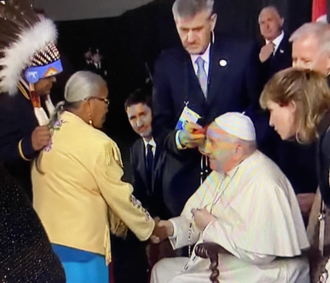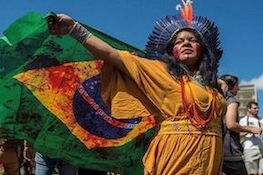Vatican rejects 'Doctrine of Discovery'

First Nation leader welcomes Pope Francis at the start of his 2022 visit to Canada. Image: ICN/JS
Source: Vatican News
The Vatican has rejected the 'Doctrine of Discovery' a year after Pope Francis met with First Nation, Meti and Inuit people from Canada, and apologized for the Catholic Church's role in the residential school system. The 15th-century doctrine expressed the idea that lands being colonized were empty, when in fact Indigenous people had long called them home.
The Joint Statement of the Dicasteries for Culture and Education and for Promoting Integral Human Development says the doctrine "did not adequately reflect the equal dignity and rights of Indigenous peoples."
Speaking of historical injustices and war crimes in his encyclical Fratelli Tutti, Pope Francis said "it is easy to be tempted to turn the page, to say that all these things happened long ago and we should look to the future. For God's sake, no! We can never move forward without remembering the past; we do not progress without an honest and unclouded memory" (Fratelli Tutti, 249)
Cardinal Tolentinol Prefect of the Dicastery for Culture and Education said in the statement, the Holy See is looking carefully at the Church's history and its regrettable association with the 'Doctrine of Discovery' which was called in aid by various colonial powers against indigenous peoples, in various parts of the world, as a justification for the expropriation of their history and the undervaluation and elimination of their cultures.
The Note recognizes that the Papal Bulls on which the colonial powers staked their claims did not adequately reflect the equal dignity and rights of indigenous peoples and that the documents were manipulated by those powers to justify immoral acts against indigenous peoples that were carried out without opposition at times from ecclesiastical authorities. The 'doctrine of discovery' was not part of the teaching of the Catholic Church, and it is repudiated in this Note, but this tragic history reminds us of the need to be ever more vigilant in our defence of the dignity of all people and the need to grow in knowledge and appreciation of their cultures. Specifically, as Pope Francis reminded us in his encyclical Laudato Si': it is essential to show special care for indigenous communities and their cultural traditions... For them, land is not a commodity but rather a gift from God and from their ancestors who rest there, a sacred space with which they need to interact if they are to maintain their identity and values (Laudato Si', 146)."
He added: "This Note is part of what we might call the architecture of reconciliation and also the product of the art of reconciliation, the process whereby people commit to listening to each other, to speaking to each other and to growth in mutual understanding. In that sense, the insights that inform this Note are themselves the fruit of a renewed dialogue between the Church and indigenous peoples. It is in listening to indigenous peoples that the Church is learning to understand their sufferings, past and present and our own failings. It is in cultural dialogue that we are committed to accompanying them in the search for reconciliation and healing. We have to live out the art of encounter."
The full Statement follows:
Dicasteries for Culture & Education & for Promoting Integral Human Development on the 'Doctrine of Discovery
1. In fidelity to the mandate received from Christ, the Catholic Church strives to promote universal fraternity and respect for the dignity of every human being.
2. For this reason, in the course of history the Popes have condemned acts of violence, oppression, social injustice and slavery, including those committed against indigenous peoples. There have also been numerous examples of bishops, priests, women and men religious and lay faithful who gave their lives in defense of the dignity of those peoples.
3. At the same time, respect for the facts of history demands an acknowledgement of the human weakness and failings of Christ's disciples in every generation. Many Christians have committed evil acts against indigenous peoples for which recent Popes have asked forgiveness on numerous occasions.
4. In our own day, a renewed dialogue with indigenous peoples, especially with those who profess the Catholic Faith, has helped the Church to understand better their values and cultures. With their help, the Church has acquired a greater awareness of their sufferings, past and present, due to the expropriation of their lands, which they consider a sacred gift from God and their ancestors, as well as the policies of forced assimilation, promoted by the governmental authorities of the time, intended to eliminate their indigenous cultures. As Pope Francis has emphasized, their sufferings constitute a powerful summons to abandon the colonizing mentality and to walk with them side by side, in mutual respect and dialogue, recognizing the rights and cultural values of all individuals and peoples. In this regard, the Church is committed to accompany indigenous peoples and to foster efforts aimed at promoting reconciliation and healing.
5. It is in this context of listening to indigenous peoples that the Church has heard the importance of addressing the concept referred to as the "doctrine of discovery." The legal concept of "discovery" was debated by colonial powers from the sixteenth century onward and found particular expression in the nineteenth century jurisprudence of courts in several countries, according to which the discovery of lands by settlers granted an exclusive right to extinguish, either by purchase or conquest, the title to or possession of those lands by indigenous peoples. Certain scholars have argued that the basis of the aforementioned "doctrine" is to be found in several papal documents, such as the Bulls Dum Diversas (1452), Romanus Pontifex (1455) and Inter Caetera (1493).
6. The "doctrine of discovery" is not part of the teaching of the Catholic Church. Historical research clearly demonstrates that the papal documents in question, written in a specific historical period and linked to political questions, have never been considered expressions of the Catholic faith. At the same time, the Church acknowledges that these papal bulls did not adequately reflect the equal dignity and rights of indigenous peoples. The Church is also aware that the contents of these documents were manipulated for political purposes by competing colonial powers in order to justify immoral acts against indigenous peoples that were carried out, at times, without opposition from ecclesiastical authorities. It is only just to recognize these errors, acknowledge the terrible effects of the assimilation policies and the pain experienced by indigenous peoples, and ask for pardon. Furthermore, Pope Francis has urged: "Never again can the Christian community allow itself to be infected by the idea that one culture is superior to others, or that it is legitimate to employ ways of coercing others."
7. In no uncertain terms, the Church's magisterium upholds the respect due to every human being. The Catholic Church therefore repudiates those concepts that fail to recognize the inherent human rights of indigenous peoples, including what has become known as the legal and political "doctrine of discovery".
8. Numerous and repeated statements by the Church and the Popes uphold the rights of indigenous peoples. For example, in the 1537 Bull Sublimis Deus, Pope Paul III wrote, "We define and declare [ ... ] that [, .. ] the said Indians and all other people who may later be discovered by Christians, are by no means to be deprived of their liberty or the possession of their property, even though they be outside the Christian faith; and that they may and should, freely and legitimately, enjoy their liberty and possession of their property; nor should they be in any way enslaved; should the contrary happen, it shall be null and have no effect".
9. More recently, the Church's solidarity with indigenous peoples has given rise to the Holy See's strong support for the principles contained in the United Nations Declaration on the Rights of Indigenous Peoples. The implementation of those principles would improve the living conditions and help protect the rights of indigenous peoples as well as facilitate their development in a way that respects their identity, language and culture.
LINK
Doctrine of Discovery Statement https://press.vatican.va/content/salastampa/en/bollettino/pubblico/2023/03/30/230330b.html


















